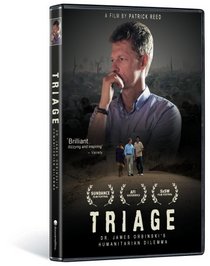| Actor: James Orbinski Director: Patrick Reed Genres: Documentary Sub-Genres: Science & Technology Studio: Docurama Format: DVD - Color DVD Release Date: 01/20/2009 Release Year: 2009 Run Time: 1hr 28min Screens: Color Number of Discs: 1 SwapaDVD Credits: 1 Total Copies: 0 Members Wishing: 0 MPAA Rating: NR (Not Rated) Languages: English |
Search - Triage: Dr James Orbinski's Humanitarian Dilemma on DVD
  | Triage Dr James Orbinski's Humanitarian Dilemma Actor: James Orbinski Director: Patrick Reed Genres: Documentary NR 2009 1hr 28min Triage: Dr James Orbinski's Humanitarian Dilemma follows the powerful odyssey of James Orbinski, a humanitarian and Nobel Peace Prize-winning doctor, as he returns to Africa to ponder the meaning of his life's work and the... more » |
Larger Image |
Movie DetailsSimilar Movies
|
Movie ReviewsA Rare Man Michael W. Perry | Author of Untangling Tolkien, Seattle, WA | 06/23/2010 (5 out of 5 stars) "Documentaries rarely leave me with an urge to meet the individual described, but this one is an exception. I would definite like to have lunch with Dr. James Orbinski or at least hear him speak. There are several reasons why that's so.
First, Dr. Orbinski is no jet-set disaster celebrity. He's there because he wants to make a difference, not because he wants to be seen at the latest Fashionable New Cause to Care About (i.e. Haiti). He comes, and he stays because he really cares and, most important of all, he establishes local roots. He builds close relationships with those who are trying to make a difference in the country where they were born, live and intend to die. He doesn't go 'slumming' for ego gratification. Second and closely related, although he accepted the Noble Peace Prize for Médecins Sans Frontieres, he bears no resemblance to a more recent Noble Peace Prize winner, Al Gore. He's not vain, not egotistical, and not full of himself. I also appreciate the fact that he's non-partisan. Too many in his field (NGOs) genuflect to politicians who occasionally toss them a bone, like too eager to please puppies. The documentary shows him refusing to clap when ex-President Clinton finishes a speech. He remembers all too well that Clinton refused to do anything to halt the Rwandan genocide. Third, there's the fact that he's come to much the same conclusion I did when I worked at a hospital taking care children with leukemia. Like me, he's been in situations when the best one can do still comes up woefully inadequate, and nothing hurts as much as seeing children dying. On a very small scale, I've been where he has been and understand his struggles. Fourth, there are the little things like the fact that as a talented physician, he could be earning a nice income. Instead, he seems to be just getting by, writing with the same low-budget iMac that I use as a free-lance writer. He has other things on his mind than getting rich. I've wrestled with many of the same issues he wrestles with in this documentary, although from a safe distance. That's particularly true with how to deal with the sorts of evil that humans inflict on one another. You can read what I have written in my reviews of two films about the Rwandan genocide: Hotel Rwanda Beyond the Gates I've concluded that humanitarian relief and the vague possibility of international intervention simply isn't enough. They've failed time and time again. What groups of threatened people need is the rooted culture, the religious beliefs, the practical training, and the necessary equipment to defend themselves by whatever means necessary. Every group should be able to halt murderous attacks by raising the costs of attacking them so high, that their enemies stand off. And in practice that means their men must fight, no matter how desperate the odds. If Tsutsi men had to fight rifles with machetes or even short pieces of pipe, that's what they should have done. They should not have regarded UN forces as their last hope. The UN and the countries of the West have failed too many times. In the end, for every people on our troubled planet the only hope upon which they can ultimately depend are their own hearts, their own minds, and their own hands. And strange as it sounds, that suggests that we need an organization, like Médecins Sans Frontieres but with kind-hearted former soldiers, men ready, willing and able to teach self-defense to those under attack. It wouldn't be pretty, but the consequences are still more horrible, and it does seem to be necessary. It might even shame outsiders into acting. It's also precisely the theme explored in two classic films: Seven Samurai (Criterion Collection) Magnificent Seven Comp Series It's a thought worth considering.... --Michael W. Perry, author of Chesterton on War and Peace: Battling the Ideas and Movements that Led to Nazism and World War II" |


